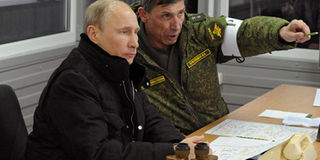Ukraine: What are Putin’s calculations?

What you need to know:
Western plots? The world according to Vladimir Putin is one in which Western powers are plotting night and day to destabilise Russia, and him personally.
Moscow.
Russia has a government and a parliament; it has commissions and committees and a national Security Council.
But all the key decisions in this country are taken by one man: Vladimir Putin. He sits on top of the “vertical of power” which he has constructed. Right now he decides which path Russia takes.
And that is why analysing Russia, working out what Moscow is thinking and planning can be difficult. You have to put yourself inside president Putin’s mind.
So what is Vladimir Putin thinking right now about Ukraine? What motivates his foreign policy moves? What is his objective?
One thing that makes Vladimir Putin mad is the feeling that he is being deceived. We saw that with Libya in 2011. Moscow was persuaded not to block a UN Security Council resolution on a no-fly zone to protect civilians.
But Nato’s military action led to regime change and the death of Col Muammar Gaddafi - far beyond what Russia had expected. It helps explain why Russia has been quick to veto resolutions on Syria.
On Ukraine, too, president Putin feels the West has tricked him. Last month he sent his envoy to Kiev to take part in negotiations on a compromise agreement between president Viktor Yanukovych and the opposition. That deal, brokered by foreign ministers from Germany, France and Poland, envisaged early elections, constitutional reform and a national unity government.
The Kremlin’s representative did not sign the deal, but Russia appeared to accept it as the best solution in a bad situation. It remained words only. Less than 24 hours later, Mr Yanukovych was on the run, the parliament removed him from power and appointed a new acting president from the opposition. The pace of events took Moscow completely by surprise.
Western plots against Russia?
The world according to Vladimir Putin is one in which Western powers are plotting night and day to destabilise Russia (and him, personally).
He remembers the Rose Revolution in Georgia in 2003, the Orange Revolution in Kiev the following year; Russia suspected the West of planning both.
More recently the Kremlin accused the West of funding and fuelling anti-government street protests in Moscow.
For months, Russia has been accusing the US and EU of meddling in Ukraine for geopolitical gains. On Tuesday president Putin said Viktor Yanukovych’s refusal to sign an association agreement with the EU last autumn “was simply used as an excuse to back opposition forces in their battle for power... it’s not the first time our Western partners have done this in Ukraine”.
Then there is the question of Nato. In an interview with the newspaper Kommersant in 2010, Vladimir Putin recalled how the alliance had promised the USSR it would not expand beyond its current boundaries.
“They deceived us in the rudest way,” Putin concluded. Could the establishment in Kiev of a pro-Western government mean future Nato membership for Ukraine? Moscow would perceive that as a direct threat to its national security.
Anything you can do...
In the West, Moscow’s intervention in Crimea has been denounced as “brutal aggression”. In Vladimir Putin’s mind, that is hypocrisy. He never loses an opportunity to remind the world about US intervention in Iraq, Libya and Afghanistan.
In his speech to the Munich Security Conference in 2007, Mr Putin denounced what he saw as a “unipolar world” - a world where the United States was the single master. He has been determined to defend what he sees as Russia’s legitimate interests around the world - be they in Syria, or closer to home in Ukraine.
What is more, with much of Europe relying on Russian energy imports and benefiting from trade with Moscow, the Kremlin calculates that its opponents in the West will not have the stomach for a serious falling-out over Russian muscle-flexing.
President Putin maintains he does not want to go to war with the Ukrainian people. He claims Russia’s intervention is “humanitarian” to protect people there from “chaos”.
But Russia’s national interests will be paramount for him: ensuring the new government in Kiev cannot eject the Black Sea Fleet from Crimea and that Ukraine’s new leaders think twice before embracing the West and rejecting Russia.
ABOUT CRIMEA
Crimea is a centre of pro-Russian sentiment. The region - a peninsula on Ukraine’s Black Sea coast - has 2.3 million people, a majority of whom identify themselves as ethnic Russians and speak Russian. The region voted heavily for Viktor Yanukovych in the 2010 presidential election, and many people there believe he is the victim of a coup.



